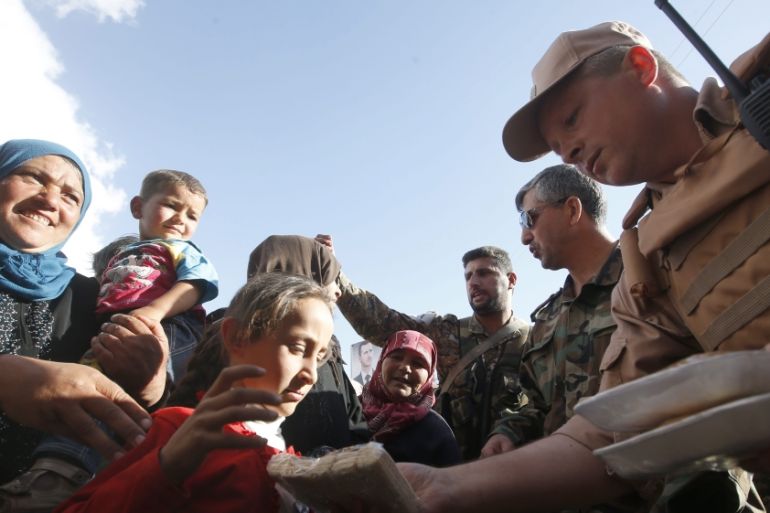Russia’s draft constitution: End of Syria’s Baath era?
The makeshift constitution is the latest effort to model post-conflict Syria in the Russian vision.

Last Tuesday, Lebanese daily newspaper, Al-Akhbar, reported that Russia had finished drafting a constitution for Syria that would remove many of the Syrian president’s powers and set up a more decentralised government, both possible concessions to rebel groups fighting the regime of President Bashar al-Assad.
According to the Al-Akhbar report, the new constitution, done with the blessing of the United States, would be put to referendum before the end of the year. This would put the countries on pace to meet their self-imposed deadline to draft a Syrian constitution by August 2016.
The Syrian presidency quickly dismissed the report, describing it as “untrue”.
“No draft constitution has been shown to the Syrian Arab Republic. Everything which has been said in the media about this subject is totally untrue,” a statement on the Syrian Presidency’s official Facebook page said.
Barely six weeks after their military intervention began, Russian officials put forth an eight-point plan called: “Approach to the Settlement of the Syrian Crisis” that provided the basic contours of Russia’s vision for ending the conflict.
This vision was rather narrow, however, as the first five points dealt specifically with the fight against the Islamic State group (ISIL, also known as ISIS), and the remaining three carried vague commitments to a political process carried out under international auspices.
For most observers, the plan represented little more than the fulfilment of the regime’s wish-list and carried with it no substantive political concessions.
|
The glimpse into Syria’s future that the draft constitution provides is one moulded out of the will and interests of the Syrian regime and its allies. |
This was certainly true. Russia was unlikely to demand or receive concessions from the regime after it had so dramatically tipped the military balance. The plan was the political correlate to Russia’s military intervention.
One of its major successes was in reshaping the political debate about the Syrian conflict in a way that was more palatable to the West by linking the fight against ISIL with a political transition process.
Bereft of any real political commitment to ending the Syrian conflict, the United States and its allies were more or less content to adopt the Russian vision embodied in the plan.
Last January, Russian President Vladimir Putin said that Syria needed to start working on a new constitution as a first step to finding a political solution to its civil war. “I believe it’s necessary to move towards constitutional reform [in Syria]. It’s a complicated process, of course. And after that, on the basis of the new constitution, [Syria should] hold early presidential and parliamentary elections,” Putin told Bild, the German newspaper.
The drafting of a makeshift Syrian constitution – to be debated and deliberated on with the United States – is thus a continuation of these efforts to model post-conflict Syria in the Russian vision in the aftermath of its military intervention.
This vision was set forth in Russia’s initial plan and reinforced by the military intervention that made a political process feasible and desirable. What distinguishes the Russian-led process from previous peace attempts is that this actually has the support of the United States, the United Nations, and a host of other countries.
What is most unfortunate is that the deliberation over the constitution will take place outside of Syria, among non-Syrians, and to the long-term, generational detriment of Syria and its people’s right to determine their future.
The leaks suggest that the constitution provides greater substance to this vision than the eight-point plan. The most substantive changes concern the division of powers between the presidency and the Council of Ministers, and between central and local authorities.
Decentralisation is one of the key features of the draft constitution, which also lays out provisions for enhancing the authority and decision-making capacity of the newly reconstituted People’s Assembly.
The specific provisions, however, do not dramatically undermine the power of the presidency. Instead, presidential power is merely reshuffled. For example, the appointment of key economic and judicial positions would fall under the responsibility of the Council of Ministers, itself a body appointed by the president.
READ MORE: Syria’s future shaped by Russian designs
More importantly, the president would retain oversight and control of the military and security apparatus. The division of political power may ultimately be cosmetic, with the main levers of political and security power remaining concentrated in the Presidency, with only certain responsibilities devolved to other political bodies.
Ethnic and sectarian representation quotas would dramatically alter the composition of Syria’s political institutions and would effectively consecrate sectarianism, much like in Lebanon and Iraq, as the dominant pole around which politics occurs.
The draft constitution also commits Syria to a neoliberal economic model and enshrines the state’s subservience to private capital interests.
|
|
The specificity of the constitutional draft on issues of national identity, ethnic and sectarian representation, division of political powers, and the commitment to neoliberalism are an indication that the Russian vision for Syria in the aftermath of its military intervention has fully materialised and is being consecrated in an internationally sanctioned political process.
There is very little pretension at this point that the political solution to the conflict lies outside of the country. This reality will not make swallowing the pill any easier, however.
The glimpse into Syria’s future that the draft constitution provides is one moulded out of the will and interests of the Syrian regime and its allies.
There are very few indications that the constitution itself will disincentivise violence, or, more importantly, create the basis for a post-conflict political system that enjoys the support of and legitimacy by Syrians.
The vision of Syria embodied in the draft constitution is not one borne out of internal deliberation, but through international fiat.
Indeed, it is a vision so far removed from even the most pedestrian political demands made by Syrians for political change.